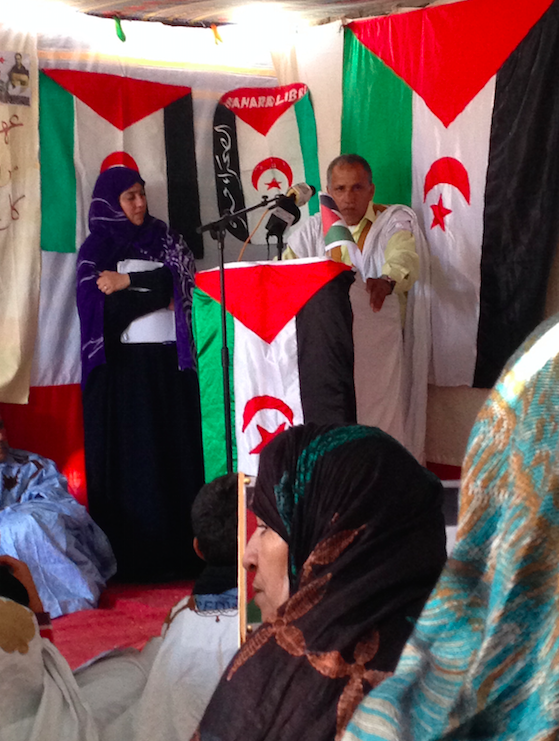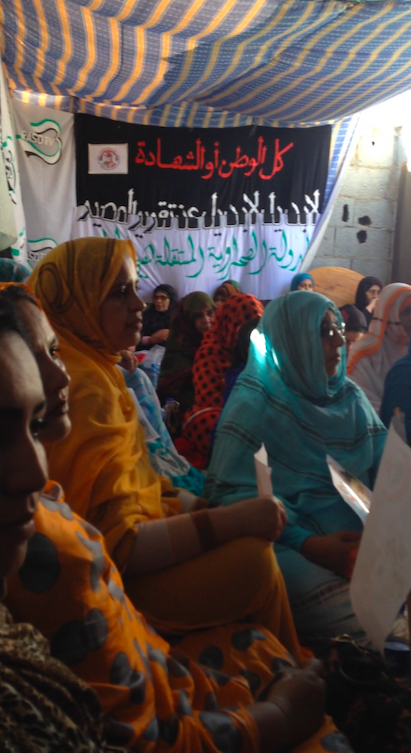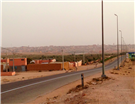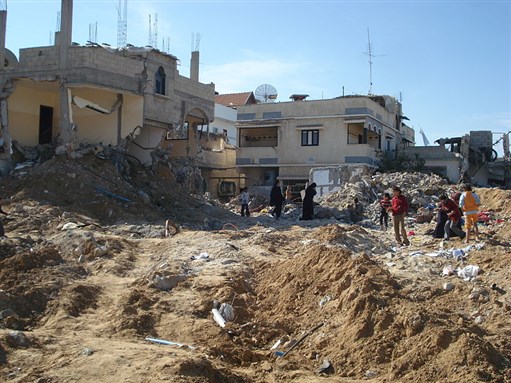[The following article is the second in a two-part series tracing the roots of settler-colonialism and military occupation in the Western Sahara. Read the first part here.]
Morocco’s Shift from Settler-Colonialism to Military Occupation
Morocco is dedicated to establishing a permanent and stable political authority in the territories, and is achieving this through military occupation. The occupation today consists of a highly militarized security sector in each city in the Occupied Territories to curb uprisings and civil resistance. In addition to the massive security regime that enforces the occupation and prevents uprisings from gaining traction, the Moroccan state constructed a sand berm to separate the Sahrawi population in the Occupied Territories from those in the Sahrawi Arab Democratic Republic (SADR). It is a 1,600 mile wall that is patrolled by Moroccan soldiers and surrounded by an estimated seven million landmines. The combination of expansive security forces, a sand berm, and the construction of Moroccan institutions and infrastructure throughout the territories has allowed the settler-colonial project to evolve into a full-blown military occupation.
Under the oversight of United Nations Mission for the Referendum in Western Sahara (MINURSO), there is still a pending referendum that the United Nations has attempted to put together within the Western Sahara for decades. This referendum is supposed to allow the decolonized peoples of the Western Sahara decide the fate of the territory and their own legal status within the territories. The result of the referendum could very well be unification with Morocco, or a fully autonomous state, but there have been innumerable obstacles put in place to prevent the people from participating in a democratic process. Due to all of the legal complications and the various actors involved in the contestation of the Western Sahara, Morocco’s military and institutional presence is a case of occupation and subject to legal condemnation.
Morocco has thus far been able to avoid demands for withdrawal by not only repeating its legitimate claim to the territory, but also claiming that withdrawal would be a crisis for Moroccan national security. This tactic consequently legitimates Morocco’s severe military presence throughout the territories and the need for local and secret police forces.[1] Not only has this turned the Western Sahara into a concern for national security, but it also serves to marginalize, disenfranchise, and delegitimize the Sahrawi resistance movement.
Out of the forty-three Sahrawis interviewed in the summer of 2014, every single person claimed that the Moroccan security forces ensured security for Moroccans, and security from Sahrawis: “If a crime is committed, the first thought is that a Sahrawi did it. Then they go from house to house. That is not an investigation. That is persecution.”[2] The feeling of racial discrimination and persecution throughout the territories is a common grievance of many Sahrawis, regardless of whether or not they actively oppose the Moroccan regime. The settler colonial project-turned-military occupation has divided the territories between Moroccans and Sahrawis, which has further manifested itself in both a systematic exclusion of segments of the population as well as cooptation.
Policies of Exclusion & Violent Suppression as Everyday Practice
The Moroccan state has taken extreme measures to ensure that its control has penetrated every aspect of social, economic, and political life. The development of Moroccan institutions and infrastructure within the territories has established preferential treatment for Moroccan settlers, Sahrawi-Moroccan settlers, and Sahrawi residents that fully support the Moroccan occupation at the expense of Sahrawi dissenters. Discrimination is prevalent in schooling, employment, college enrollment, and travel.
In terms of schooling, there are trade schools in Laayoune, Dakhla, and Smara, but all colleges and universities are located within Morocco proper. Sahrawis must have the financial resources to move out of the territories and into major cities where the universities are located.[3] In addition to the geographic and financial obstacles, there is currently only one library under construction in the city of Laayoune. Prior to that one library, there were none located throughout the Occupied Territories.
In order to provide support for those experiencing discrimination in Moroccan institutions, Sahrawi communities have attempted to create social networks and organizations that can help with coping and overcoming these obstacles. However, Sahrawis are not legally allowed to form any type of civil society organizations, regardless of whether or not they are focused on politics, social programs, or economic types of assistance: “Activists are forced to meet inside of each other’s homes, and make sure to avoid clandestine police forces. There is no political freedom here and there is no right to oppose the regime.”[4] In addition to being unable to establish social organizations or support groups, Sahrawis that directly engage in political opposition and resistance receive the worst treatment of all.

[Human rights activist, Mohammed Daddach, presenting a speech during an activist press conference commemorating Sahrawi martyrs. Image by author.]
Organized nonviolent resistance has existed throughout the Occupied Territories prior to the start of Moroccan settler-colonialism. In fact, the resistance movement led by the Polisario Front began toward the end of Spanish colonialism.[5] Spain’s slow withdrawal from the territory and its reluctance to hand over administrative control to local leaders ultimately led to the formation of the Polisario Front under al-Wali Mustafa Sayyid.[6] The Polisario’s formation also included a number of members from the Moroccan Liberation Army in the south. When Moroccan settler-colonialism and military occupation replaced Spain’s colonial presence, the Polisario Front and its supporters continued to resist. Therefore, organized resistance and fervent political opposition to the lack of self-determination persists to the present-day. As a response to political opposition, the Moroccan government implemented extreme measures of securing stability and suppressing the resistance.
On 15 June 2014, a non-violent demonstration in Laayoune took place on Smara Street, which is the main avenue that runs across the length of the city. Activists had been organizing it for several days, making sure that they would filter out onto the street from different connecting streets in small groups. From the early afternoon onward, police and military vehicles lined Smara Street for several blocks. The neighborhood that is known for housing many prominent activists was blocked off by military police vehicles, and patrolled by riot police. For the entire day activists were calling each other and exchanging information about the police surveillance.[7]
The Moroccan security regime in the three main cities of Laayoune, Smara, and Dakhla consists of secret police dressed in civilian clothing that drive civilian vehicles, state police, military soldiers, and riot police.[8] Due to the civilian disguises they often use, they are able to penetrate both public and private spheres in the territories. During the monthly nonviolent protest, organized to take place at the same time and in each major city of the Occupied Territories, the security forces militarize protest sites and create twenty-four-hour surveillance teams prior to the scheduled demonstration.[9] They restrict Sahrawi mobility and access to protest centers. They verbally harass, physically assault, and video record all participants in the demonstration.
During the June protest, the demonstrators who successfully made it to Smara Street were instantly met with violent force. Women were pushed backwards and knocked to the ground as taxi cabs maneuvered around them without stopping.[10] Secret police officers embedded within the demonstration took pictures and videos of everyone’s faces with their camera phones. According to activists, the police did this so they could keep a record of who participated in the demonstrations on a regular basis, after which they would follow them home to threaten them and their families. The violence only escalated when one woman, a popular activist in Laayoune, was punched in the face after she was knocked to the ground. Her fellow female activists rushed her back into her neighborhood, and a group of twelve Moroccan secret police officers followed them. Throughout the entire duration of the protest, which lasted less than one hour, no Sahrawi protester was armed, aggressive, or violent towards any individual on Smara Street.
This particular protest was not an isolated event. On the contrary, it is representative of the violence inflicted upon nonviolent protesters all throughout the cities of the Occupied Territories. The Moroccan military occupation has sustained its presence within the Western Sahara by doing precisely what it did on 15 June: suppress any and all possibilities of political resistance. Sahrawis are totally unable to express their political opinions in public, and this reproduces an image of a Moroccan Sahara that is stable and legitimate.

[Image of Sahrawi activists and the tent where many conferences are held. Image by author.]
The security regime does not solely focus on the Sahrawi population and resistance projects, but it also monitors and restricts visitors and tourists who enter the territories. Numerous Sahrawis recounted stories of journalists, reporters, and tourists who were followed, monitored, searched, and ultimately expelled from the territories shortly after their arrival: “We try our best to help foreigners get in and talk to us, see what is happening. But unless you are with a human rights group and have permission from the King, you cannot stay.”[11] The Moroccan security regime maintains strict surveillance over all foreigners that enter the territories and makes certain that their mobility is restricted so that little data is collected regarding the military occupation. Ultimately, the security regime has been highly effective at preventing tourists and journalists alike from witnessing public Sahrawi demonstrations for self-determination and their violent suppression by means of blunt force.
The Role of Geopolitics
Countering political activism, the Moroccan government has used its influence to deprive Sahrawis of independence. Morocco enjoys close economic ties with the European Union and a historically close diplomatic relationship with the United States. These international alliances have allowed the Moroccan government to fully institutionalize an illegal military occupation in the Western Sahara with minor public disapproval. The Moroccan state continues to exploit and control the Western Sahara’s natural resources and provide economic incentives to international actors to fund resource development initiatives in the region, with virtually no political criticism.
In 2001, the Moroccan government agency, Office National de Recherches et d’Exploitation Pétrolieres (ONAREP) reportedly signed two exploration agreements with private companies Kerr-McGee from the United States, and TotalFinaElf from France. The European Union, its member states, and the United States directly benefit from resource exploitation that the Moroccan occupation of the Western Sahara facilitates.
Earlier this year, Morocco succeeded in striking up large-scale economic contracts with foreign companies. The kingdom brokered a new fishing agreement with the European Union regarding Sahrawi territorial waters in the occupied city of Dakhla, and US oil company Kosmos Energy won a contract to begin drilling off the coast of the Western Sahara as well. Most recently, President Obama signed into law a bipartisan congressional resolution effectively reversing US policy on foreign aid sent to Morocco. The resolution allows for foreign aid to be used in the Occupied Territories of the Western Sahara, which serves to legitimize Morocco’s illegal presence in the region and directly supports the occupation. Regardless of the constant protest and opposition from Sahrawis and the Polisario, Morocco continues to draw on Western support and draft new economic agreements with international allies at the expense of the Sahrawi population.
Broader Implications: Missing Piece of the “Arab Spring”
The colonizer in this conflict is not a Western power, with a long history of colonization, imperialism, and exploitation abroad. Rather, it is an Arab-Muslim state that claims to have historical ties to the land prior to the arrival of Spanish colonial powers. The problem in this conflict is not the international agreements that delineate universal human rights and entitlements, but rather a failure on the part of both Morocco and the international community to adhere to, respect, and implement these international instruments in practice.
In light of the “Arab Spring’s” focus on human rights and dignity, it is surprising discussions about self-determination have not focused on the Western Sahara. In October 2010, a protest camp, known as Gdeim Izik, was set up in the Western Sahara and attracted tens of thousands of Sahrawis. Occurring only weeks before Tunisian Mohamed Bouazizi set himself alight, the protest stood against the lack of job opportunities and discrimination against Sahrawis. Gdeim Izik ended tragically, with dozens of deaths, injuries, and arrests following the Moroccan security forces’ violent response. Even more disturbingly, the movement failed to gain international media attention.
The relative obscurity of the Western Sahara conflict cannot simply be attributed to a lack of armed conflict between warring parties. Even in times of relative peace, Israel-Palestine still garners significant international attention. It seems, where the Western Sahara is concerned, the outsized influence of one party (Morocco) and the economic interests of the international community trump human rights and democratic processes.
It is difficult to analyze Morocco’s military and political strategies for evading legal and international repercussions, and it is all the more difficult to understand exactly how they could be so successful in an alleged era of decolonization. Morocco continues to garner international support from strategic allies through extensive and costly lobbying efforts in the United States, costing the state about four million dollars a year. In recent months, agents on social media have also uncovered the amount of time and money the Moroccan government spends on prolonging their control over the Western Sahara by manipulating journalists and diplomats to support their occupation. One particular Twitter account, @chris_coleman24, released several classified documents from Moroccan government officials and started the Moroccan WikiLeaks.
The Moroccan government’s dual approach to maintaining control over the Western Sahara through settler-colonialism and military occupation has proven itself durable after combatting several decades of Sahrawi political opposition. Although both approaches are inexcusably illegal according to various instruments of international law and the United Nations, the Moroccan state has been able to follow a colonial logic and occupy a non-self-governing territory all of this time. Meanwhile debates surrounding neo-colonialism in contemporary history focus on the effects of globalization in the developing world and the predatory power of developed states, there is a complete failure to acknowledge the colonial and illegal endeavors of non-developed states.
The Moroccan military occupation of the Western Sahara does not fit the current critique of neo-colonial Western states interfering in the domestic affairs and sovereignty of other states. The state itself was subject to years of French colonialism, which infiltrated every aspect of Moroccan life in the early twentieth century through a combination of settler-colonialism and cultural accommodation strategies.[12] Regardless of this colonial history, the Moroccan state did not hesitate to draw upon these types of strategies in order to acquire territory south of its borders and marginalize, oppress, and disenfranchise an entire population.
There is a crucial need to distinguish this conflict as one of illegal military occupation, because the definition itself provides substantial clarity about the moral status of Morocco’s position. While many that are engaged in the debate over the legality of the occupation, the justifications for Morocco’s control, or the defense of human rights for the Sahrawi people, it is necessary to first and foremost take a principled stance. Being a non-self-governing territory in the twenty-first century, the formerly colonized peoples of the Western Sahara have a right to vote on the future of their territory. They have a right to vote on their legal status. Whether the result is independence or incorporation into Morocco, it is a choice to be made by an eligible electorate. Only from there can the international community attempt to work towards a post-colonial era, free from colonial logic, territorial ambitions, and self-interests.
[Parts of this article were originally published by Muftah.org. This research was made possible thanks to grants provided by the Georgetown Institute for Women, Peace, and Security and the Georgetown Center for Contemporary Arab Studies.]
[1] Agencie Marocaine de Presse
[2] Anonymous Interview. Translated by the author from Arabic to English. Private room; El Aaiún, Western Sahara. June 28, 2014
[3] Zunes, S. & Mundy, J. (2010) Western Sahara: war, nationalism, and conflict irresolution. Syracuse: Syracuse University Press. Print, p. 157
[4] Anonymous Interview, MINURSO employee, conducted in English. Private room; El Aaiún, Western Sahara. July 1, 2014
[5] Zunes & Mundy
[6] Jensen, E. (2005) Western Sahara: Anatomy of a Stalemate. 2nd ed. Boulder, CO: Lynne Rienner Publishers. Print, p. 11.
[7] Participant observation, Laayoune, Western Sahara, Smara Street, June 15, 2014
[8] Interview: Anonymous, Laayoune, Western Sahara, private home, May 22, 2014
[9] Participant observation, Laayoune, Western Sahara, Smara Street, June 15, 2014
[10] Participant observation, Laayoune, Western Sahara, Smara Street, June 15, 2014
[11] Interview: Anonymous, Laayoune, Western Sahara, private home, May 22, 2014
[12] Charrad, M. (1990). “State and Gender in the Maghrib”. Middle East Report. 163(Mar-Apr. 1990), pp. 19-24.
![[Landscape shot of Laayoune from the southwest of the city. Image by author]](https://kms.jadaliyya.com/Images/357x383xo/ScreenShot2015-01-12at11.48.40AM.png)















